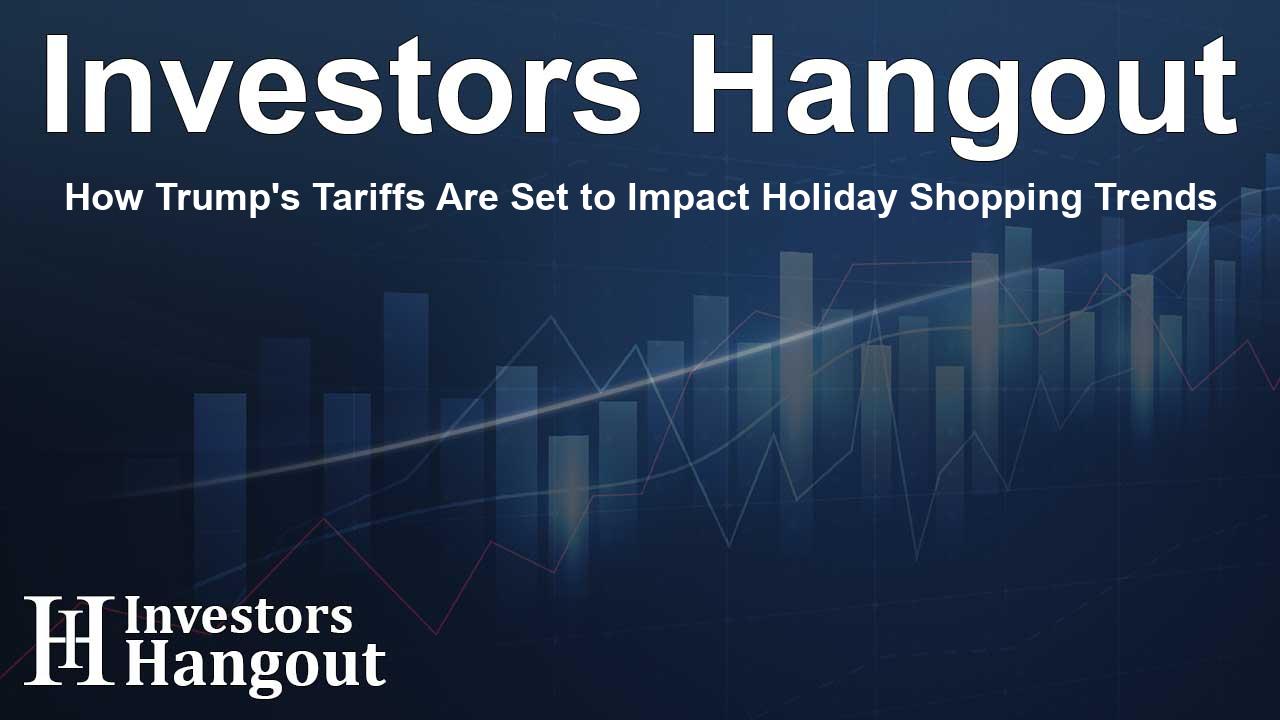How Trump's Tariffs Are Set to Impact Holiday Shopping Trends

Impending Changes in Retail Amidst Tariff Concerns
The U.S. retail landscape is bracing itself as the holiday shopping season approaches, with potential shifts caused by tariffs recently imposed by the administration. These tariffs are primarily impacting the cost of imported goods, raising concerns among retailers and consumers alike.
Insights from Industry Reports
A recent report from Wells Fargo & Co. sheds light on how the retail sector might respond to these changes. The findings note that since the tariff announcements, retailers have been adapting their strategies to minimize adverse effects. These adaptations include an increase in stock levels to buffer against potential tariff costs, while some retailers have opted to cut back on orders and focus on their most popular products.
Impact on Promotions and Pricing Strategies
According to Jeremy Jansen, the head of global originations at Wells Fargo Supply Chain Finance, a significant shift may occur with a reduction in promotional activities. “Retailers may prioritize maintaining stable prices over offering extensive discounts,” stated Jansen. This leads consumers to anticipate fewer favorable promotions on essential items than in previous years.
Higher Prices and Limited Selections Expected
This fall, customers can expect prices to rise, especially on tariff-sensitive categories such as clothing, home furnishings, and seasonal decor. Retailers are likely to begin their promotional campaigns earlier, around September and October, in an effort to manage demand and avoid stock shortages during key shopping months.
Consumer Behavior Under an Economic Strain
Despite the tougher environment, customers are still on the lookout for alluring deals. However, the nature of discounts they pursue may change, with shoppers focusing on more selective promotions. In light of increasing costs, consumers might become more strategic about their spending.
Broader Implications for Seasonal Spending
The ramifications of these tariffs are already manifesting, particularly evident during the back-to-school shopping wave which saw a reported increase in costs by 9%. School supply prices are also on an upward trend, impacting household budgets adversely.
The rise in prices extends beyond just back-to-school shopping; it also grips essential spending areas. For instance, meal costs associated with school lunches are climbing, thus straining family finances. Furthermore, inflation worries have reached the level of Social Security recipients; many express concerns that their payments may not keep up with inflationary pressures.
Corporate Responses to Cost Challenges
Amidst these challenges, executives like Walmart CEO Doug McMillon have publicly acknowledged the financial strains on families. He noted that while Walmart is absorbing most of the increased costs from tariffs, only a fraction—ranging from 4 to 5%—is being passed on to consumers. This illustrates the delicate balance retailers must maintain to sustain sales while managing profitability.
Preparing for a Complicated Holiday Season
As the holiday season nears, the unpredictable landscape of pricing and availability will likely complicate shopping experiences for consumers. Retailers will need to showcase adaptability while attempting to meet consumer expectations amid tighter budgets and inflationary concerns.
The Path Ahead for Retailers and Shoppers
Ultimately, both retailers and shoppers are navigating a new normal shaped by economic pressures. The upcoming months will be crucial for observing how companies adjust their marketing strategies, inventory management, and customer engagement techniques to align with evolving consumer behaviors and expectations. Effective strategies will be essential for finding success in a challenging retail climate such as this.
Frequently Asked Questions
What are the primary effects of President Trump's tariffs on retail?
President Trump’s tariffs are expected to increase prices on imported goods, leading to higher consumer costs and changes in product availability.
How are retailers responding to tariff-related challenges?
Many retailers are adjusting their inventory strategies and reducing promotional offers to better manage costs and ensure product accessibility.
What changes should consumers expect this holiday shopping season?
Shoppers may find higher prices, fewer promotional discounts, and limited choices in certain categories, particularly for tariff-sensitive items.
How has inflation impacted back-to-school shopping?
Back-to-school shopping has become notably more expensive due to tariffs, driving costs up by about 9% compared to previous years.
What measures are retailers like Walmart taking in response to tariffs?
Walmart has managed to absorb most cost increases, passing on only a small percentage to consumers in an effort to maintain market competitiveness.
About The Author
Contact Olivia Taylor privately here. Or send an email with ATTN: Olivia Taylor as the subject to contact@investorshangout.com.
About Investors Hangout
Investors Hangout is a leading online stock forum for financial discussion and learning, offering a wide range of free tools and resources. It draws in traders of all levels, who exchange market knowledge, investigate trading tactics, and keep an eye on industry developments in real time. Featuring financial articles, stock message boards, quotes, charts, company profiles, and live news updates. Through cooperative learning and a wealth of informational resources, it helps users from novices creating their first portfolios to experts honing their techniques. Join Investors Hangout today: https://investorshangout.com/
The content of this article is based on factual, publicly available information and does not represent legal, financial, or investment advice. Investors Hangout does not offer financial advice, and the author is not a licensed financial advisor. Consult a qualified advisor before making any financial or investment decisions based on this article. This article should not be considered advice to purchase, sell, or hold any securities or other investments. If any of the material provided here is inaccurate, please contact us for corrections.
